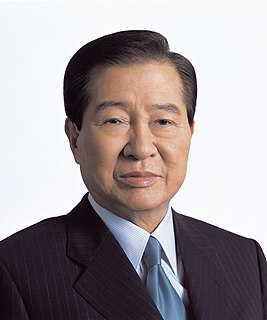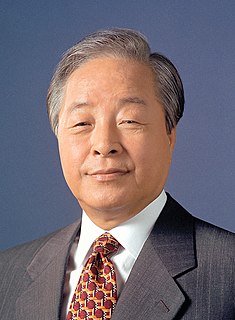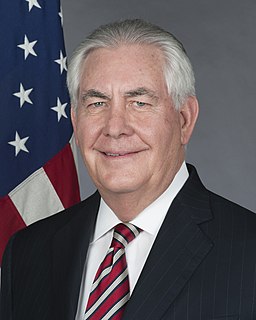A Quote by Kim Dae Jung
So South Korean ability is very much limited to handle North Korean, you know, difficulties. So we don't want to see an immediate collapse of the North Korea regime.
Related Quotes
Beijing cannot sit by and let her North Korean ally be bombed, nor can it allow U.S. and South Korean forces to defeat the North, bring down the regime, and unite the peninsula, with U.S. and South Korean soldiers sitting on the Yalu, as they did in 1950 before Mao ordered his Chinese army into Korea.
I think the regime in North Korea is more fragile than people think. The country's economic system remains desperate, and one thing that could happen for example would be under a new government in South Korea, to get the South Korean government to live up to its own constitution, which says any Korean who makes it to South Korea, is a Korean citizen. A citizen of the Republic of Korea. And you could imagine the impact that would have inside North Korea if people thought, "If I could get out and make it to South Korea, I could have a different life."
During the periods when South Korea played a more active role, the inter-Korean relationship was more peaceful, and there was less tension between the United States and North Korea. The last U.S. administration pursued a policy of strategic patience and did not make any effort to improve its relationship with North Korea. Also, the previous Korean government did not make any such efforts. The result is the reality you see today - North Korea continuing to advance its nuclear and missile program.
In contrast, Western historians, and those in South Korea, say the North attacked the South on June 25, 1950. Both sides agree that after the war began, the North Korean Army captured Seoul in three days and pushed as far south as Pusan before American troops arrived to drive back the North Koreans nearly as far north as the border to China.
The North Korean regime remains one of the world's leading proliferator of missile technology, including transfers to Iran and Syria. The transfer of nuclear weapons or material by North Korea to states or non-state entities would be considered a grave threat to the United States, and we would hold North Korea fully accountable of the consequences of such action.
The message that we must send to North Korea is twofold: If the North Korean regime believes that it can defend and protect itself through nuclear and missile programs, that is a misjudgment. But if North Korea gives up its nuclear program, we will help it secure and develop itself. We must consistently send these two messages.
It's important to understand the policy of the U.S. towards North Korea is to deny North Korea possession of a nuclear weapon and the ability to deliver that weapon. Our strategy has been to undertake this peaceful pressure campaign we call it enabled by the four no's.The four no's being that we do not seek regime change, a regime collapse, an accelerated reunification of the peninsula, and we do not seek a reason to send our forces north of the demilitarized zone.


































